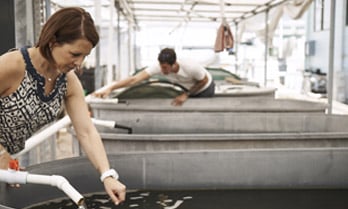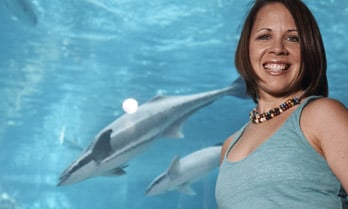Dr Angela Moles, The University of New South Wales
01 September 2011
Big ecology: from tundra to rainforest, desert to savanna
Why are some plant seeds very small and others large? Angela Moles tackled this simple question by compiling information on 12,669 plant species. She discovered that plant seeds in the tropics are, on average, 300 times bigger than seeds in colder places like the northern coniferous forests. She then used these data to follow the evolutionary history of seed size over hundreds of millions of years.
She used her L’Oréal For Women in Science Fellowship to investigate the relationship between plant appearance and how much they get eaten by animals. Virtually all animals depend either directly or indirectly on energy gained from eating plants. For the animals, eating leaves and seeds is a good thing. For the plants, it can be a disaster. She investigated two strategies plants use to avoid being eaten.
Qualifications
2006 Postgraduate Diploma in Higher Education (learning and teaching), Macquarie University
2004 PhD (Ecology), Macquarie University: The seed size synthesis
1997 Bachelor of Science, First Class Honours, Victoria University of Wellington, NZ
Career highlights, awards, fellowships, grants
2007 Senior Lecturer, Evolution & Ecology Research Centre, School of Biological, Earth and Environmental Sciences, The University of New South Wales
2007 Australian Research Council Discovery grant: Naturalisation to invasion: how do naturalised plants become successful invaders? (awarded to M Leishman, B Murray, A Moles, D Richardson & J Klironomos)
2006 Lecturer in plant ecology, Victoria University of Wellington, NZ
2006 Faculty Small Research Grant to fund data collection for project on global patterns in plant height, Victoria University of Wellington, NZ
2006 New Researcher’s Grant to establish a long term study of how plant-animal interactions are changing in response to climate change, Victoria University of Wellington, NZ
2006 Victoria University of Wellington University Research Fund Grant to continue work on the World Herbivory Project
2005 Macquarie University Research Development Grant to fund collection of plant diversity data at the World Herbivory Project study sites (awarded to A Moles & E Seabloom)
2004 Australian Research Council postdoctoral research grant, Macquarie University
2004 Amazon Conservation Association grant: Latitudinal gradients in biotic processes affecting plant growth and establishment, Los Amigos, Peru
2004 Australian Geographic grant to help set up Australian sites for the World Herbivory Project
2004 Macquarie University Vice-Chancellor’s Commendation for Doctoral thesis
2003 Postdoctoral Researcher, National Center for Ecological Analysis and Synthesis, University of California, Santa Barbara, USA
2003 National Center for Ecological Analysis and Synthesis postdoctoral fellowship: The radiation of seed mass strategies worldwide
2003 Australian Research Council Discovery grant: Latitudinal gradients in biotic processes affecting plant growth and establishment (awarded to A Moles & P Coley)
2002 New Zealand Ecological Society award for best publication by a new researcher
2001 New Zealand Ecological Society award for best student presentation at the conference
2000 Australian Postgraduate Award for PhD study
1998-2000 Research Assistant for Mark Westoby, Macquarie University
1997-1998 Research Assistant for Donald Drake, Victoria University of Wellington




